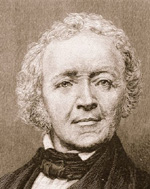Seeing History
TraditionsWith the usual forgery situation, you are up against the effort of one person to deceive you. It can get worse than that. Nations and cultures, tribes and families, constantly reshape or invent their perceived past, to serve their present disputes and support their future aspirations. They do this in part by constructing stories, painting pictures, or telling tales which in individual hands would count as forgeries. In all probability, "history" itself first arose, not as an information process, but as a glorification process. The idea that history exists merely to report on the past is a notion both recent and precarious. It is indeed that banner under which the scientific historian operates. But history as it is done by those engaged in history more often has the purpose of creating, out of the awkward real past, a fictive but presently usable past.
St Ursula (shown above being martyred). William Tell. You name it.
That cultures invent or reinvent themselves is itself is a fact of history, and it may properly be reported along with the rest of history. But the historian stands apart from that process, as an observer of what really happened (or didn't happen) and of what use later ages made of that event (or lack of an event).
There are implications here for the credibility of evidence. It is readily believed that even though deeds and speeches of past monarchs may be suspect, such things as lists of Chinese rulers, or Greek Olympiads, or the consuls of Republican Rome, or the genealogy of a family in any culture, are likely to be true, because they are both important to those possessing them and in principle capable of being preserved in list form over considerable periods of time.
Investigation has not always dealt kindly with these suppositions. For example, Polynesian genealogical chants exist not only to preserve original lineages, but also to incorporate conquered lineages; they expand at a constant rate just as Carbon 14 loses radioactivity at a constant rate. We may still cherish our hopes about the reliability of traditional information, but we need to be alert for evidence that argues against our hopes being fulfilled in any particular situation.
There are also negative traditions. In Jan-gwo Tsv #479 we read:
In the days of King Kang of Sung, a hawk was hatched in a tit's nest on the city wall. The astrologer was ordered to explain the omen, and said, "Great born from small, Sung will rule them all." The King was delighted. He destroyed the state of Tvng, attacked Sywe, and annexed the territory of Hwai-bei. These successes only made him yet more arrogant. Desiring to hasten his hegemony, he shot at Heaven and cudgeled Earth. He tore down his country's altars and burned them saying "Even the gods of Heaven and the spirits of Earth are subject to me." To show his fearlessness, he cut open the deformities of the hunchbacked and hamstrung the clubfooted. His people were terrified.
Chi heard of it and attacked him. His people fled and the cities were undefended. The King escaped to Ni-hou, where he sickened and died.
Generations have taken this at face value. It has no face value. It is standard atrocity propaganda, of the sort that is produced in volume for the justification of wars of invasion and annexation. It is not something for the modern reader to get personally indignant about. It is just another of the things traditions do; things that the historian should not be deceived by.
Since the reshaping of tradition is always at work, we have as our best defense the Ranke maxim, which we may here repeat: the earliest evidence, as less exposed to that effect, is normally the best evidence. To use later evidence, let alone the voice of later tradition itself as enshrined in some history meant for internal consumption, is the basic mistake in doing history:
"I see the time coming when we will base modern history no longer on secondhand reports, or even on contemporary historians, save where they had direct knowledge, and still less on works yet more distant from the period; but rather on eyewitness accounts and on the most genuine, the most immediate, sources" (History of Germany in the Reformation, 1839)
Keeping that focus take a certain amount of effort, but it is appropriate effort. We are not here to take sides. We are here to watch other people taking sides.
- John Martin Vincent. Historical Research. Holt 1911. St Ursula is at p147-151
17 Dec 2006 / Contact The Project / Exit to Outline Index Page

